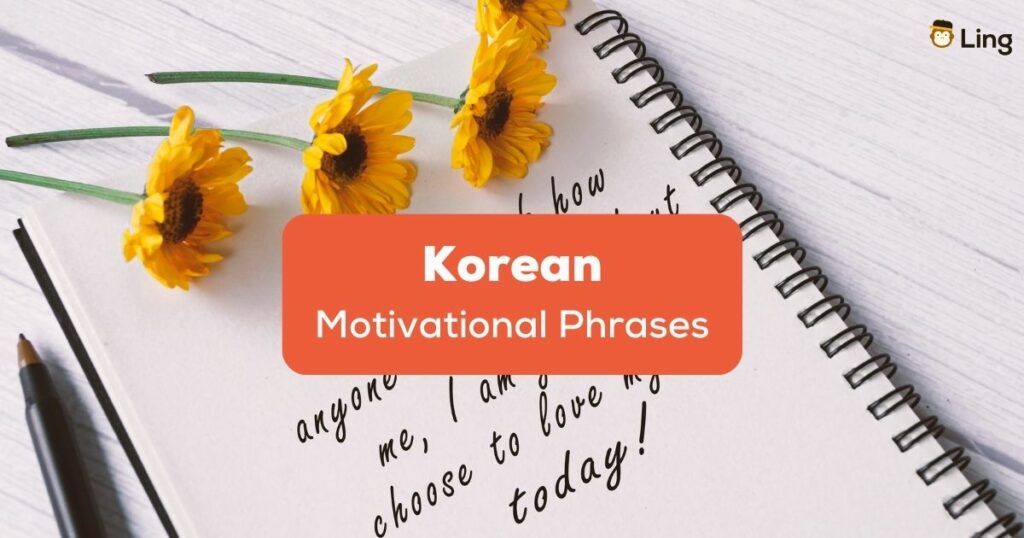You might know a lot about Korean by now. You might be aware of the grammatical rules, hangul, Korean culture, and whatnot. But are you aware of the ways that you can motivate your friends and partners in the Korean language?
In this blog post, we will walk you through all the essential Korean motivational phrases that will act as fortune favors for you. So let’s get started!
Korean Motivational Phrases
It is important to know the Korean motivational phrases as a learner of the Korean language. This can help you craft your ideas in a better way. English translations are not always essentially helpful and thus you should know what might be the right thing to say at every moment. You can also get insight into the Korean culture by looking into the popular Korean quotes and words etc.
1. To Start – 파이팅! (Paiting!)
There are countless English phrases to use when you want to tell someone to get set ready, go. But is there something in Korean, that you would say to someone when they are about to start something?
Yes, there is. The Korean people use the word 파이팅! (Paiting!) when they want to encourage someone. This word has been derived from the English word, fighting. Now, you must be wondering if this word is exclusive to the fight only. Like a certain word that the players tell each other before wrestling.
The answer is no! Even though the name sounds aggressive, it’s just energetic. The word fighting represents the valor and zeal that people have before doing something. It is one of the Korean slang words that Korean simply love.
Korean people use the word 파이팅! (Paiting!) a lot. They use it before taking an exam, before going for sports, and even before proposing to someone. So even when you’re going to confess your love for someone, your friends might use this phrase.
This becomes your go-to phrase if you want to motivate anyone at any time. Some nice Korean hand gestures like a thumbs up could make this phrase even more mobile.
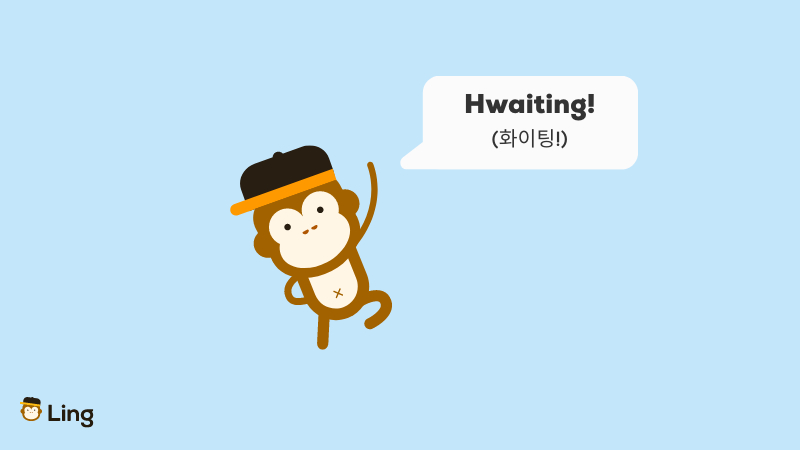
2. To Start – 화이팅 (Hwaiting)
A Korean version of the word 파이팅! (Paiting!) is 화이팅 (Hwaiting). Both tend to deliver almost similar meanings but the second one sounds closer to the Korean language than the first one. K-pop stars tend to use 화이팅 (Hwaiting) a lot.
3. Let’s Go – 아자 (Ah-Ja)
Another phrase to motivate someone is by saying 아자 (ah-ja). This is yet another nice way to tell someone that you can do it. Or if you want to invite someone to do something and you want to say something like let’s go, you can say 아자 (ah-ja). It’s a bit older than 화이팅 (Hwaiting) or 파이팅! (Paiting!) .
A decade ago people were obsessed with using this phrase over and over again. But now it’s just conventional orthodox or traditional at this point. People do not use it a lot, and if you’re going to use it in front of some people they might consider you old. However, you can use it with some oldies who become your friends one day, you never know.
It is important to know the meaning of this word in case you ever hear it in a Korean drama or someone uses it as a joke and you know the context. If we would have to suggest you use 아자 (ah-ja) or 화이팅 (Hwaiting) we would say, always go for the latter since it will make it sound cooler.
4. Come On, Let’s Go – 아자 아자 파이팅 (Aja Aja Paiting)
Our previous Phrase leads to another phase which is 아자 아자 파이팅 (aja aja paiting). This is also an old way of motivating someone. People ten years ago used to motivate each other by saying 아자 아자 파이팅 (aja aja paiting).
Not many people do that anymore. People simply say 화이팅 (Hwaiting) or 파이팅! (Paiting!) when they want to encourage someone. However, you might hear the people say 아자 아자 파이팅 (aja aja paiting). And you should know what that means when they say that.
5. It Is Ok – 괜찮아 (Gwaenchanh-A)
What would you say if you ever see someone being too embarrassed in the public? What if someone does something really stupid that everyone laughs at? How would you try to encourage that person? You might say 화이팅 (Hwaiting) is a good option here, but no.
You can say 화이팅 (Hwaiting) after dismissing their embarrassment. To help them get over the guilt of insults that they’re going through, you can say 괜찮아 (gwaenchanh-a). 괜찮아 (gwaenchanh-a) is a very nice and friendly way to tell someone that everything is OK.
It would encourage them to overcome their fear. If you meet a Korean and you commit a mistake then they might say 괜찮아 (gwaenchanh-a) just to make you feel better about it and elevate their mood.
You cannot expect someone to say 괜찮아 (gwaenchanh-a) when you commit a sin or a bigger mistake like cheating on someone. However, if you do something very silly and small, like dropping a bottle in stress. Then the people around you will say 괜찮아 괜찮아 (gwaenchanh-a, gwaenchanh-a).
Saying 괜찮아 (gwaenchanh-a) in repetition makes it even more polite. For instance, if a child falls down right before a race starts, the people would tell the child that it’s okay by saying 괜찮아 (gwaenchanh-a) and asking him to get up. Only a rude person would not say 괜찮아 (gwaenchanh-a) when someone else apologizes for something.
괜찮아 (gwaenchanh-a) can be a bit informal and you cannot use it with people who are older than you. If an older person gets embarrassed in front of you and you say 괜찮아 (gwaenchanh-a) then it might embarrass them even more since they would perceive it as you’re not respecting them.
Formal Version
The polite version of this phrase is 괜찮아요 (gwaenchanh-ayo). Feel free to say 괜찮아요 (gwaenchanh-ayo) with your boss or professional colleagues at your work etc. Korean actors tend to use this phrase a lot.
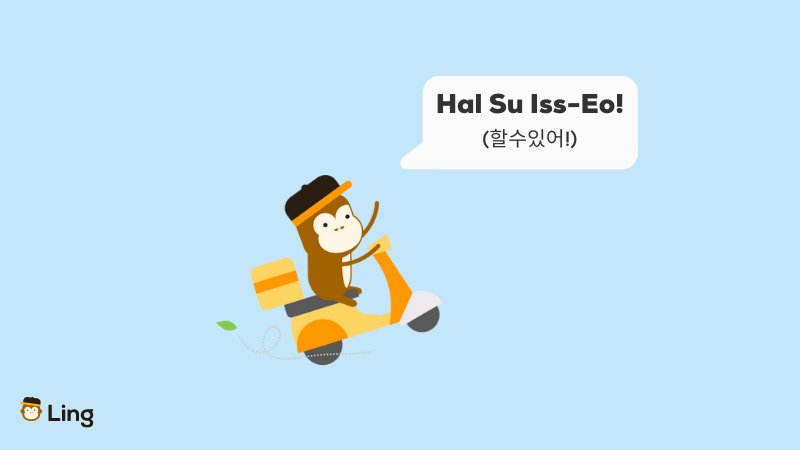
6. You Can Do It – 할 수 있어 (Hal Su Iss-Eo)
If you want to boost someone’s confidence and want to make them do something you can say 할 수 있어 (hal su iss-eo). This literally means that you can do it.
Korean people say that when they want someone to do something. It could be both for themselves or for the other person. For instance, if you want a friend to go up the stage and sing a song because they have a beautiful voice, you can say 할 수 있어 (hal su iss-eo).
Or, if your friend is too shy to talk to another girl, you can say to make them feel better 할 수 있어 (hal su iss-eo). Another situation can be when your friend is too shy to get a haircut but is willing to go for it.
In Korean dramas, it has been shown a lot that the guys are telling each other 할 수 있어 (hal su iss-eo) so that they can muster up some courage and do what they are afraid to do.
Formal Version
The polite version of 할 수 있어 (hal su iss-eo) is 할 수 있어요 [hal su isseoyo]. While you are encouraging an older person to do something you cannot say 할 수 있어 (hal su iss-eo) since that might sound more like an order and less like an encouraging phrase.
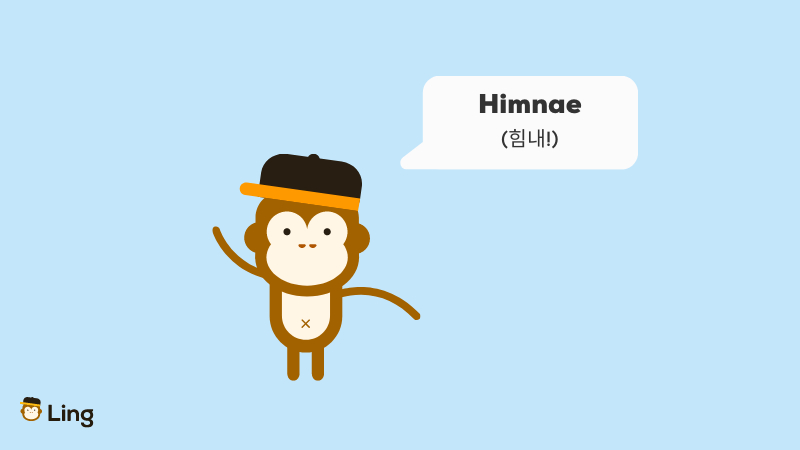
7. I Am There For You – 힘내 (Himne)
If you want to inform someone of your presence and you can say 힘내 (himne). 힘내 (himne) is a nice way of telling someone that you are there for them and no matter what you will be there for them.
The literal translation of 힘내 (himne) is cheer up. When someone seems really down low or sad you can say 힘내 (himne) to cheer them up. It is very common for Korean people to say 힘내 (himne) when someone or the entire group is sad about something.
Let’s say your friends have failed a very important match. To cheer them up, you can say 힘내 힘내! 술 마시러 가자(him ne him ne! sul masileo gaja), which means cheer up! let’s go for a drink. Or something like 힘내 힘내! 밤 새 술 마시자 (him ne him ne! bam se sul masija) meaning cheer up! let’s drink the night away.
Formal Version
Again, it is an impolite version and informal way of saying cheer up. You can only use it with the people younger than you or the people who are your friends or close to you.
힘내세요 (himneseyo)
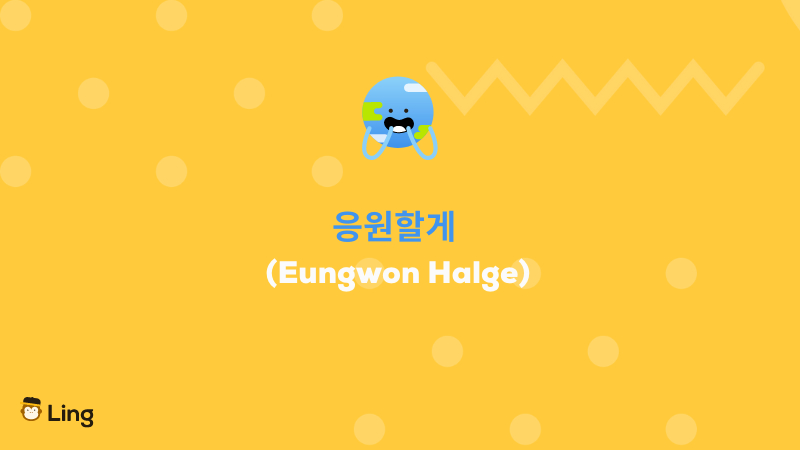
8. I’ll Support You – 응원할게 (Eungwon Halge)
What might be the best thing to motivate someone? Being there for them. In Korean, if you want someone to know that you’re there for them, you can say 응원할게 (eungwon halge). 응원할게 (eungwon halge) means I’ll support you.
If a friend of yours is feeling really low and they’ve done something that they dread doing. They might need you to stand by them and say 응원할게 (eungwon halge). Korean people tend to use it a lot when they want you to know that they stand with you.
Formal Version
The formal version of 응원할게 (eungwon halge) is 응원할게요 (eung-wonhalgeyo). You can use it with people who are older than you. For example, with your mother, etc.
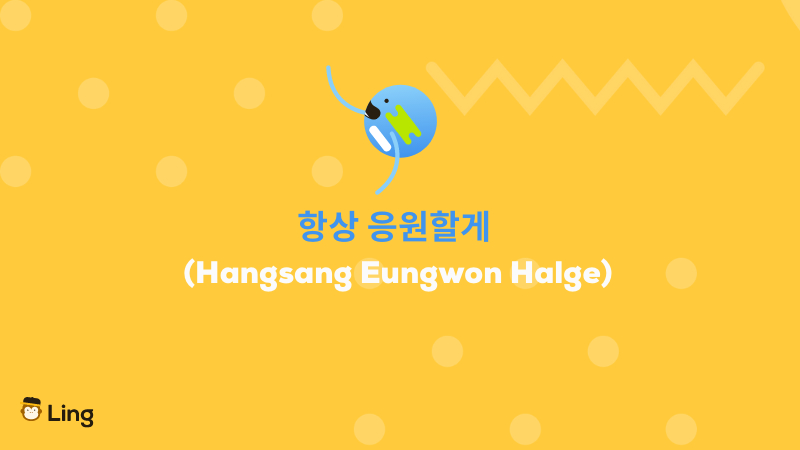
9. I’ll Alywas Support You – 항상 응원할게 (Hangsang Eung-Wonhalge)
Another way of confirming that you will be there for someone forever is by saying 항상 응원할게 (hangsang eung-wonhalge). This is just like the previous one with the addition of another word, which is always. This phrase means that I will always support you. This phrase is exclusive to the people whom you love. If you have a best friend, you can tell them that you’ll be always there for them.
For example, if your spouse is worried about their future and they do not know what they might do, you can tell them 항상 응원할게 (hangsang eung-wonhalge) meaning I will always support you. If a person in your life is feeling insecure about themselves or their future or anything important to them. You can tell them 항상 응원할게 (hangsang eung-wonhalge) in that situation as well.
Formal Version
The formal or polite version of this phrase is 항상 응원할게요 (hangsang eung-wonhalgeyo). If your father figure dies and you need to give some comfort to their wife then you can say 항상 응원할게요 (hangsang eung-wonhalgeyo) to help them know that they do not have to be alone anymore and you will assist them.
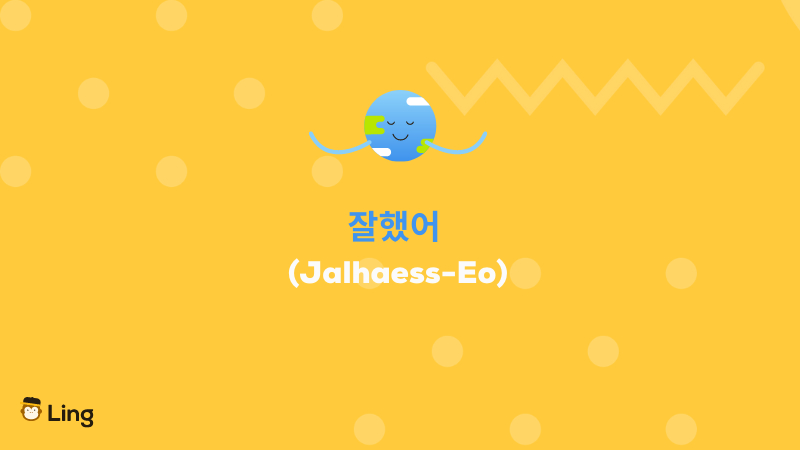
10. Great Work – 잘했어 (Jalhaess-Eo)
There are also some kind words to encourage someone. 잘했어 (jalhaess-eo) is one of them. The word 잘했어 (jalhaess-eo) means great work or you nailed it. You can use it on several occasions like learning a new South Korean Dialect etc. For example when a child starts learning to take responsibility for their own actions then you can say 잘했어 (jalhaess-eo).
Korean people say it to everyone who seems like doing a nice job, even a monkey. If you are learning Korean then knowing this phrase might do wonders. If your Korean friend makes scrumptious Korean rice cakes, you can say 잘했어 (jalhaess-eo).
You should know not to use 잘했어 (jalhaess-eo) at bad timing. Or else it might backfire. Many people use the phrase 잘했어 (jalhaess-eo) as a sarcastic comment on someone else’s actions. For example, if someone does something with their own will yet fail badly then your response could be 잘했어 (jalhaess-eo) as a sarcastic reply.
Do not use 잘했어 (jalhaess-eo) when someone has done something really stupid or has failed at something because they might assume that you are mocking them. For example, your friend failed poorly at making Korean food, you might joke around saying 잘했어 (jalhaess-eo).
Formal Version
While talking to older people you can say 잘했어요 (jalhaess-eo yo). If you are teaching someone how to cross a road and they finally do that then you can say 잘했어요 (jalhaess-eo yo) to encourage them.
Other Phrases
Inspirational Korean Quotes
There are also several inspirational and famous Korean quotes and Korean idioms that you should know about.
Learn Korean With Ling Now!

Are you looking for the best time and place to learn Korean? Then you are at the right place. You will not only get translated material but also the inspiration to study hard. The Ling app helps you achieve a better score on your tests TOPIK. Learning Korean is easier if you start at an early age. We make it easy even at an old ripe age of 60 years for our learners. You get ample material to learn about South Korea and the Korean language. Don’t miss out in this learning opportunity and download the app on the Play Store or App Store now!
Happy Learning!
